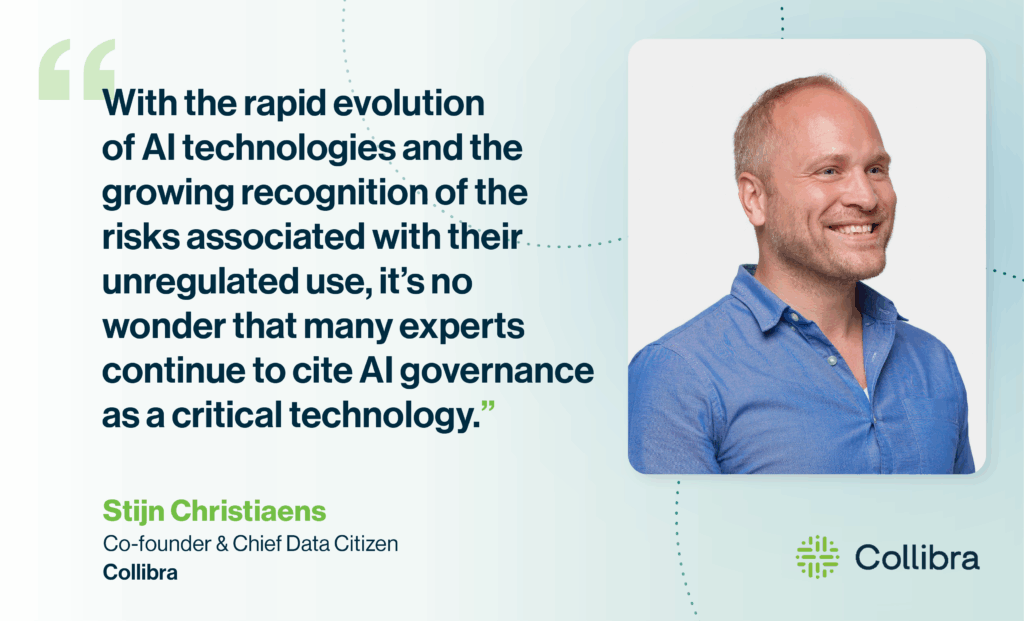Whether it’s budget cuts, evolving trends or bigger economic uncertainty – or all three as we are currently experiencing – today’s data management, privacy and AI experts are no strangers to change or the pressure from the C-suite and customers to pivot quickly. And this change and pressure will only grow thanks in large part to today’s fast-paced AI-centric world where the constant need and expectation to innovate and do more with less is keeping tech leaders up at night.
In fact, a recent survey by Collibra and The Harris Poll – which gauged the top concerns of more than 300 tech decision makers in the U.S. – found that 76% of respondents say that they’re concerned about the ROI on new data privacy and AI initiatives. However, 86% said they plan to move forward with these projects, regardless of compounding external challenges. And when we consider these stats alongside the broader results of the study, it’s clear that many organizations are now working overtime to navigate an unprecedented level of priorities around risk management and the opportunity for technological growth and innovation.
The state of play
In terms of both investment and adoption, the rise of AI has been meteoric and virtually unrivaled by any other technological breakthrough in recent memory. More specifically, investments in AI-based technologies have only continued to soar, with some firms expecting the global valuation to reach upwards of $200 billion by the end of 2025. Additionally, the active use of AI solutions among businesses has followed a similar trend, with 71% of organizations saying they had integrated generative AI into the workplace in 2024, a near 40% increase from the previous year.
It’s no surprise that most business leaders today aren’t prepared to let emergent AI initiatives be stifled by external factors, even if they’re treating the current market volatility with varied levels of caution. More specifically, Collibra’s survey found that while nearly all large companies (96%) report their existing AI plans won’t be disrupted by the evolving economic landscape, roughly 78% of both smaller and medium-sized organizations say they’ll still be moving forward, albeit with a decidedly more cautious and measured approach to overall investment and implementation.
In my view, this reflects a modern business landscape in which corporate leaders recognize that some initiatives require resilience in the face of adversity more than others, and in which many are adapting their risk management strategies accordingly. And fortunately, as the report indicates, we are seeing that the top concerns of tech leaders are not keeping them from moving forward with key data privacy and AI initiatives. Whenever possible, my advice to these leaders is to stay the course to help offset any potential turbulence along the way.
Despite broader economic uncertainty, internal decisions by tech leaders suggest a strong, forward-looking commitment to AI. Our survey revealed that nine out of ten employees at larger organizations report that their companies are not only encouraging AI use but also providing the tools to do so effectively. Just as telling, nearly the same number say they’ve received formal policies and guidelines to govern how they interact with AI. From the top down, 88% of decision makers express strong confidence in their current AI strategies, with 75% identifying targeted training and upskilling across the workforce as a leading priority. These figures point to a sector that, while navigating headwinds, is doubling down on innovation and long-term investment in technology.
Balancing AI innovation with strong AI governance policies
And while this long-term view is not easy to navigate during economic uncertainty, it’s essential that enterprises also balance AI innovation with AI governance which is now an essential organizational capability.
With the rapid evolution of AI technologies and the growing recognition of the risks associated with their unregulated use, it’s no wonder that many experts continue to cite AI governance as a critical technology. In fact, Gartner identified AI governance as one of the top strategic trends of 2025. And just as cloud adoption and data security saw increasing regulation in the past decade, the same pattern is emerging for AI, driven by both regulatory developments and internal organizational pressures. Globally, we are witnessing the rise of regulatory frameworks aimed at governing AI practices.
Here is how enterprises should think strategically when it comes to AI governance:
- Establishing frameworks: Develop policies for responsible AI practices aligned with legal and ethical standards
- Enhancing transparency: Use explainable AI techniques to make decision-making processes understandable to stakeholders
- Investing in compliance: Allocate resources for monitoring and audits to ensure adherence to regulations and internal policies
- Fostering AI literacy: Practical experience with AI use cases strengthens employees’ understanding and accountability for responsible AI management
- Enhancing AI traceability: Track data flows and model outputs with complete oversight and granular control—through a single pane of glass, from data input to model output.
- Engaging stakeholders: Build trust through open communication, ensuring AI initiatives align with the expectations of customers, partners and regulators
- Strengthening data reliability: Establish robust data management practices to ensure that AI systems are powered by accurate and trustworthy data
- Aligning systems, people and AI initiatives: AI success demands a unified governance framework—not a patchwork of disconnected rules, systems, and stakeholders
As AI becomes more embedded in business operations, governance will not only be about managing risk—but also about accelerating the deployment of AI initiatives while ensuring they are reliable, traceable, compliant, and aligned with organizational goals. Companies that proactively implement robust AI governance programs will stay ahead of the curve and set themselves up for gaining a potentially priceless benefit: the trust of their customers. And enterprises who can figure out how to stay the course and balance AI innovation with a strong AI governance policy will not only be two steps ahead of the competition but will be able to confidently scale AI capabilities and create lasting business value.




